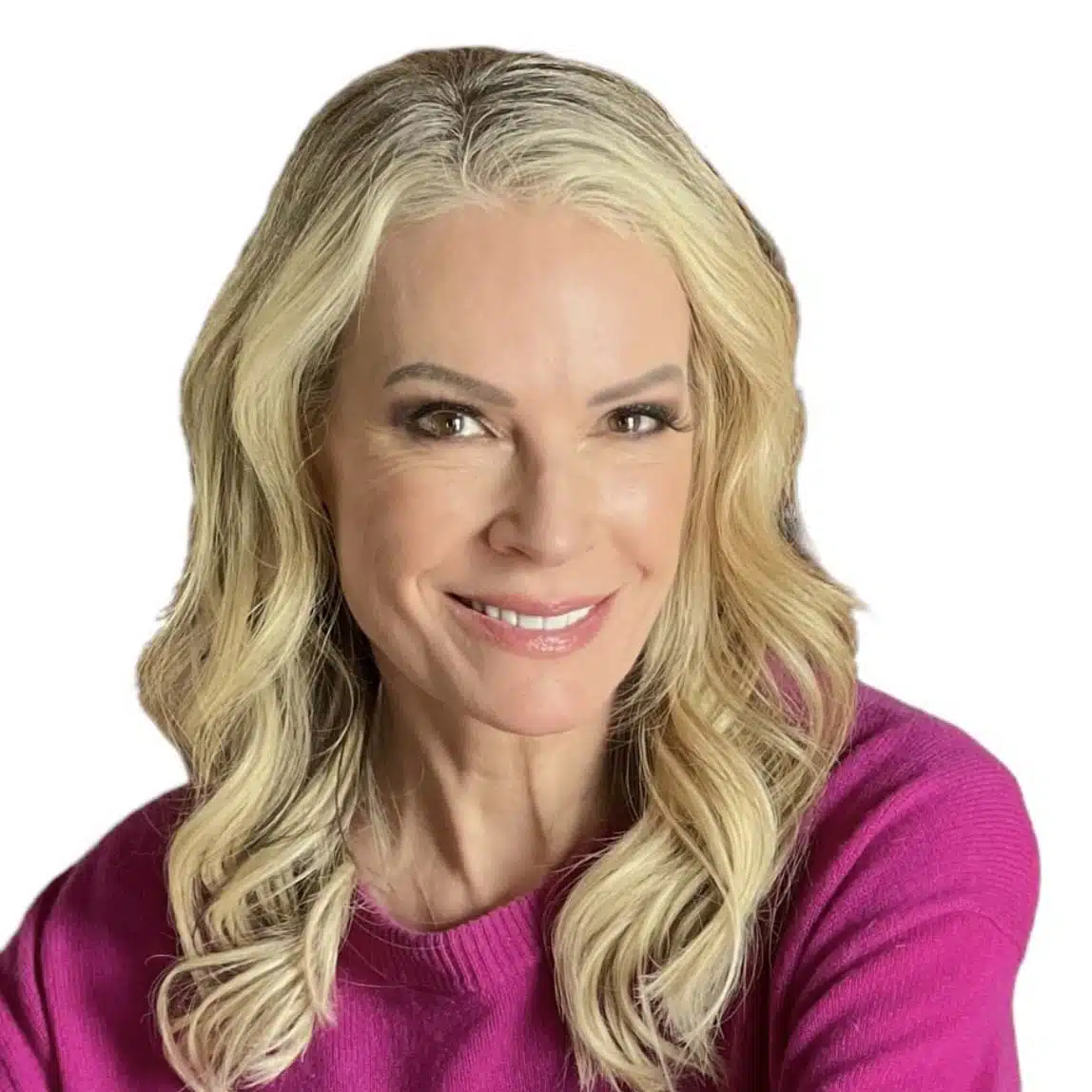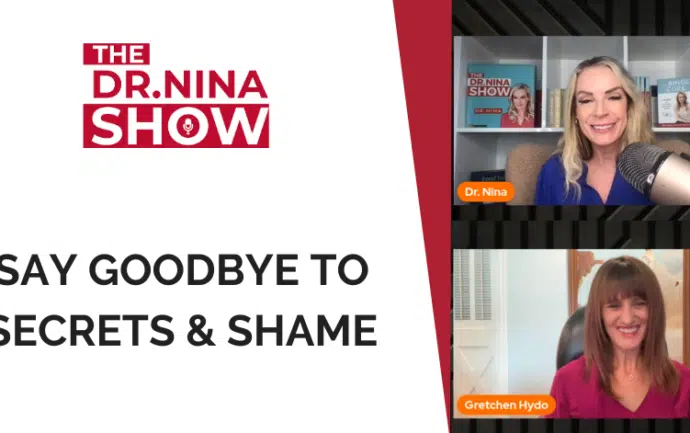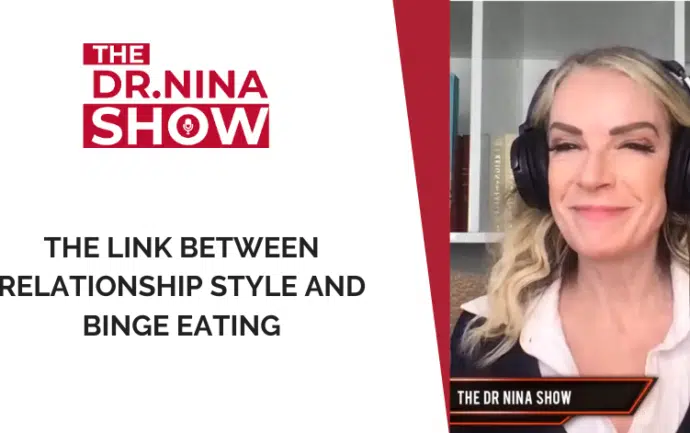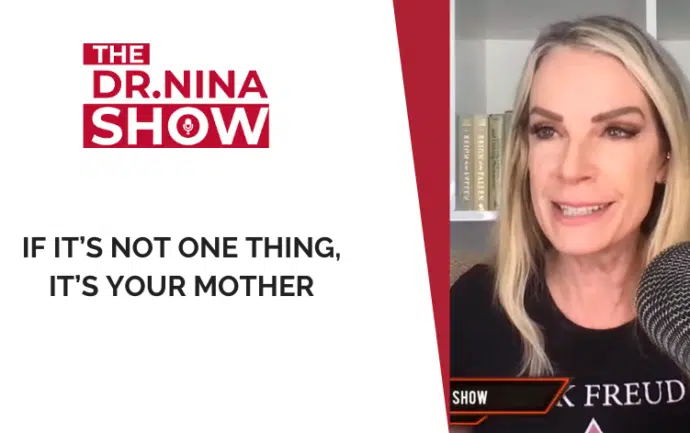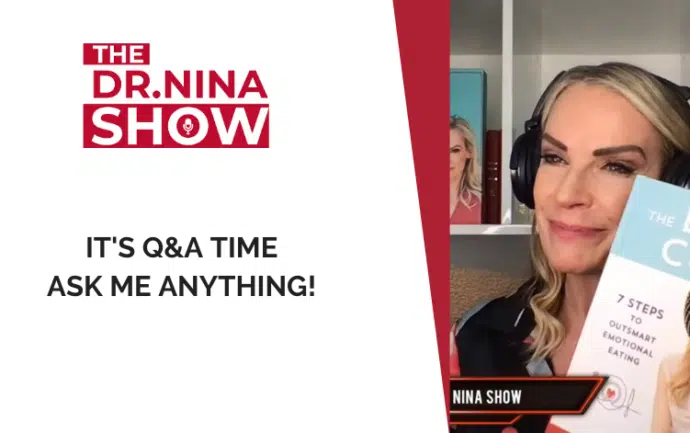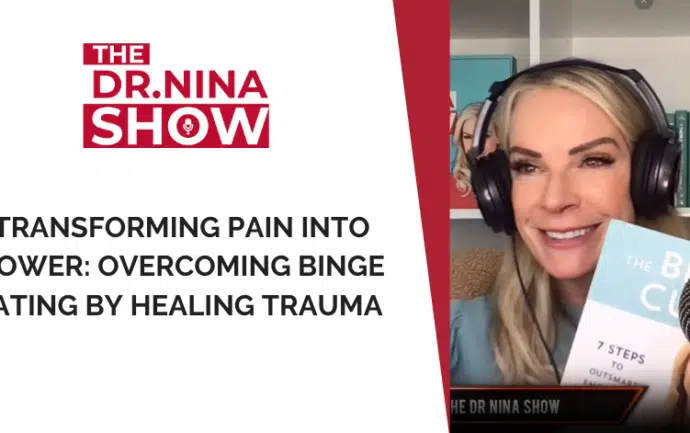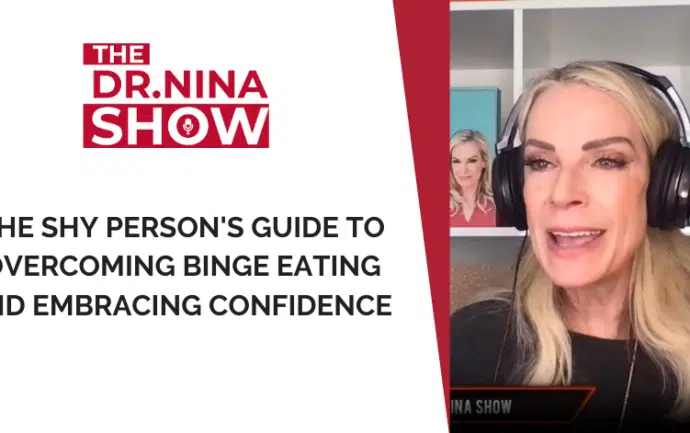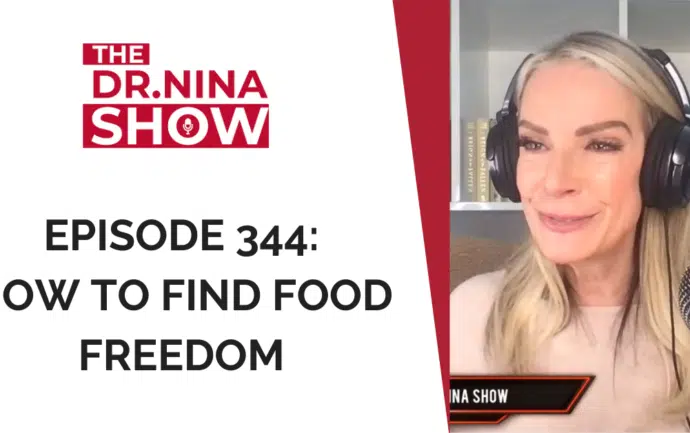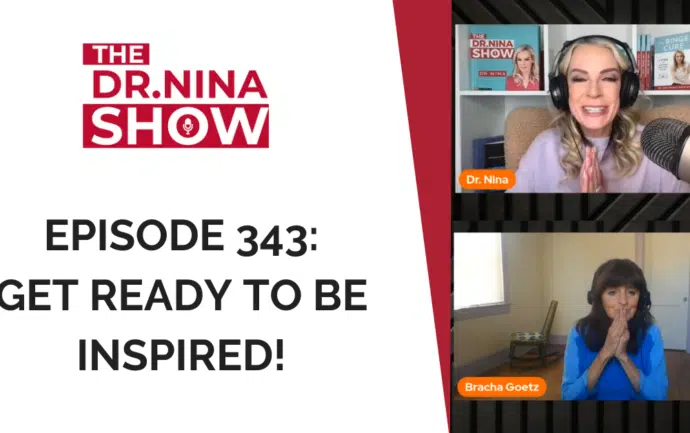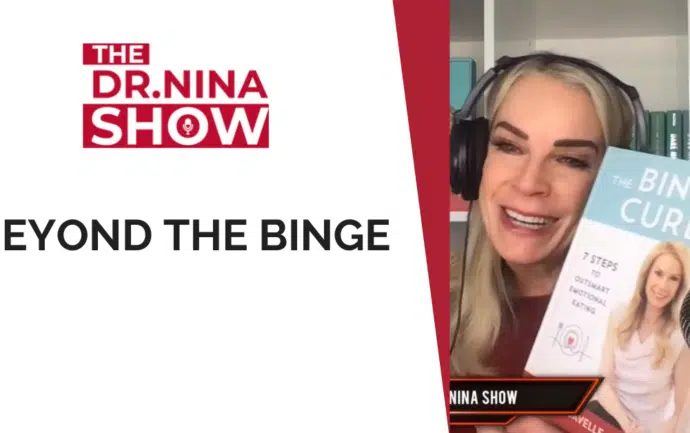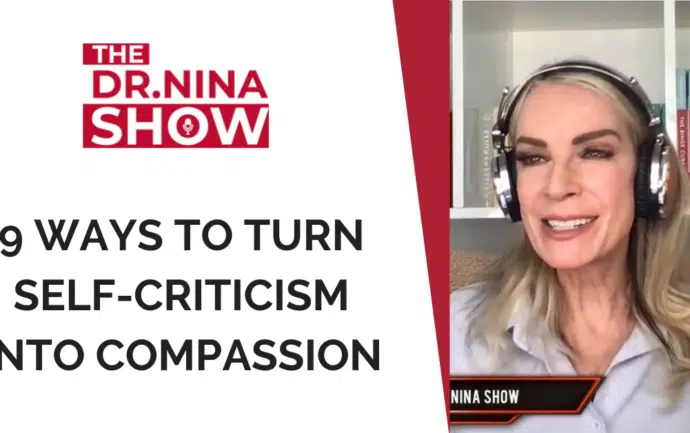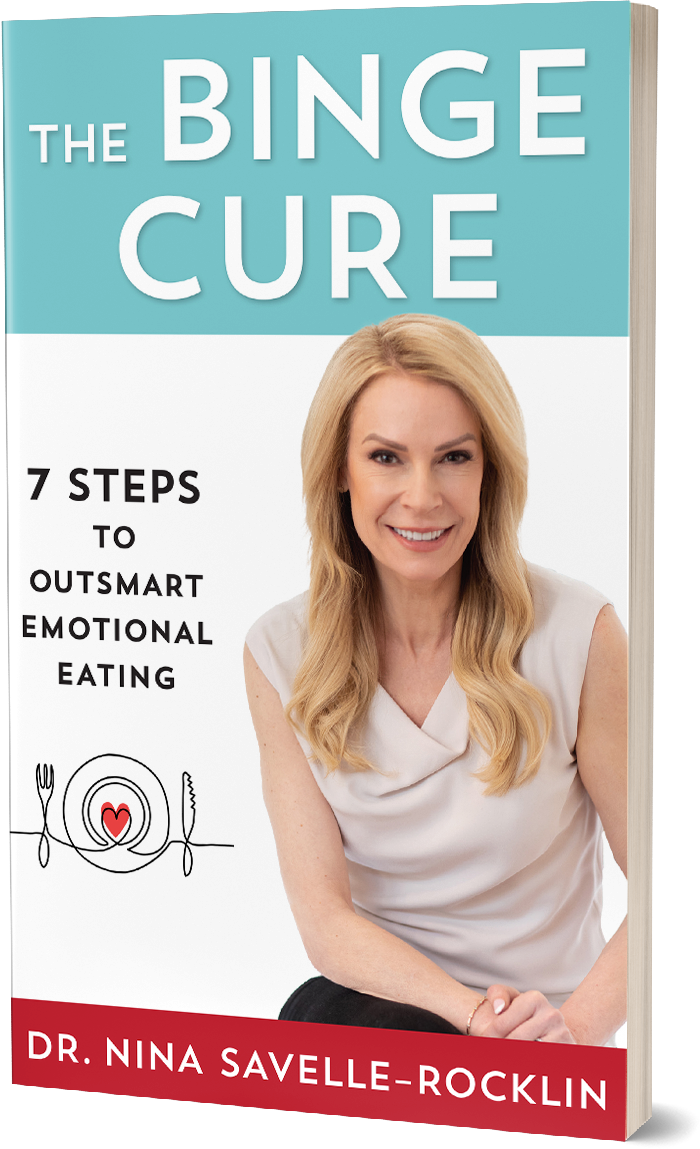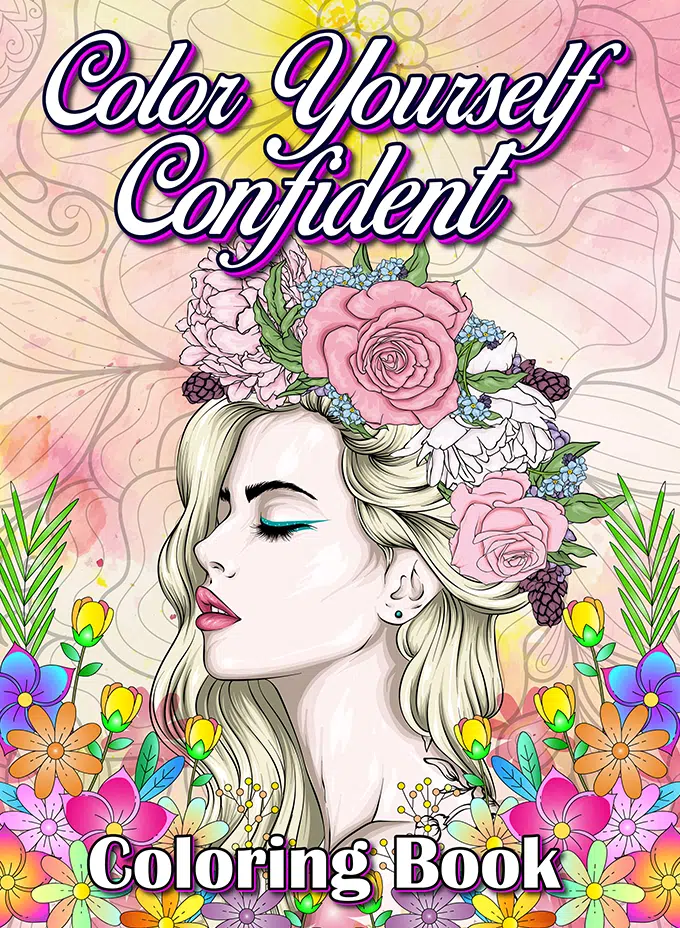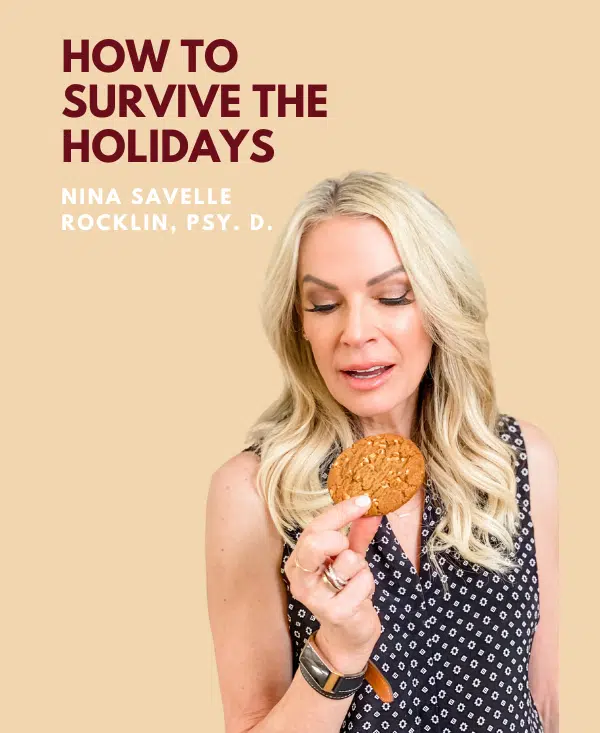Dr. Nina Savelle-Rocklin
How Does Someone Deal With Overwhelming Emotions, Helplessness, and Cheerios
Transcript
You’re listening to the Dr. Nina show with Dr. Nina Savelle Rocklin only on La talk radio.
Dr. Nina: Hi there. Welcome to the Dr. Nina Show here on LA Talk Radio. I am your host, Dr. Nina Savelle-Rocklin, and I am here to help you stop counting calories, carbs, and fat grams, so you can easily get to a healthy weight and get on with your life. That is what it is all about. I want you to wake up and think about your day, not your diet. What a concept. You have a lot more on your mind than what you weigh, what you’re gonna eat? There’s a lot more to you than the number on the scale.
I want to hear about it. Call me, or if you’re on Instagram, text me… whoops. Whoops. I’m doing something… what did I just do? I just totally messed up my feed. Can you guys on Instagram see me? Okay. Sorry, guys. The number here is 323-203-0815. 323-203-0815. Josh is saying that he might be feeling depressed today. Josh, I am very sorry to hear that. Can you let me know if you have a question related to depression? Otherwise, I will talk about it, but again, 323-203-0815, or you can post a question on Instagram because I’m also LIVE there. I would love to know what is on your mind, and what is weighing on you, because the real problem with binge eating, stress eating, any kind of emotional eating… the real problem is not food. The real problem is what is eating at you.
Josh is saying, feeling depressed, ordered some lunch… so, I don’t know if that is a lunch designed as some kind of binge distraction from the depressed feeling; whether you’re depressed, whether you’re anxious; whatever is going on, what you need to do is respond to yourself in a way that is generative that makes you feel better. Lunch is a distraction. Food is a distraction. You feel bad, there’s a reason you feel bad.
If you are… let’s just go with depression. You have to ask yourself, “Well, why am I depressed?” Now, that might be a silly question. You might think, “Well, who isn’t depressed right now with the pandemic and uncertainty, and the United States, the political situation, and oh my gosh, Ruth Bader Ginsburg.” There’s so much to be depressed about on a global scale. You may be depressed because things are going on in your life that are not going as planned. Maybe just life has thrown curveballs at you.
Whatever it is, honor that depression, and what I mean by it that is, don’t try to tell yourself not to be depressed. Tell yourself, “Of course you’re depressed.” Validate and acknowledge what you are feeling. So, say, “Of course, I’m depressed for the following reasons. I’m depressed because of this, this, this, and this. How could I not be depressed?” Validate and acknowledge, and then maybe you want to reassure yourself, “I am going through a tough time. Tough times don’t last. Tough people do.”You tell yourself all the reasons why you want to encourage yourself, right? “I won’t always feel this way. I’ve been through tough times before. I’ve been depressed before, maybe, and I’ve gotten over it, or anxious, or worried, or scared,” or whatever it is that you’re feeling, “and I’m gonna get through this, as well.”
He’s saying, “Okay, that makes sense. I won’t be overeating.” Yes, because overeating when you are feeling bad, whether it is depression or anything else, it is an abandonment of yourself. Really, what it is saying, “I don’t want to feel anything, so I’m going to abandon myself, and I’m just going to go into the food coma or the whatever, the zone.” People have told me they go into the dead zone when they’re binging, or stress eating, or just eating compulsively, or whatever you’re doing for eating to get away from a feeling. You’re not really feeling anything. It’s an abandonment of yourself, and what you really need to do, rather than abandon yourself with food, is to be very present for yourself.
Ariel, thank you for the hearts! Hi, Monica. Hi, Josh. Hi, everyone who is currently joining on Instagram. Please post a question if you have one like Josh posted a comment.
So, binging, stress eating, all of that, even thinking about food… it is an abandonment of yourself. If your friend was depressed, would you say to your friend, “Hey, I know just what to do? Come on. Let’s go to lunch. Hey, let’s eat this ice cream together.” Maybe you would, but I hope not. Hopefully, you would talk to your friend. “What’s going on? Talk to me. What’s happening? Why are you depressed? Let’s talk it through.” “I feel like I might start crying before I eat.” Well, that means you need to cry. Crying is a sign… hi, Melissa. Crying is a sign that you are hurting. Crying is a way of expressing your feelings. Crying is not a sign that you’re a crybaby. Crying is not a sign that you are weak. Crying is not a sign of anything other than the fact that there is something going on emotionally with you that needs your attention, and if you’re going to use food to distract from it, then you’re not paying attention to yourself. You’re abandoning yourself, and we don’t want to do that. We want to stay with you and be a friend to yourself.
If you’re depressed, okay. What’s going on? Why? What are the things that are happening? What are the thoughts that you are having about life that is leading to these feelings of depression? Then, instead of telling yourself not to feel it, because a lot of times, what I hear from people is they say, “Oh, but I’m so lucky for the following eight reasons. Yeah, this bad thing is happening right now, and yes, we’re going through a pandemic. And yes, it’s affected me financially and emotionally, and yes, I’m stuck with my partner and I just don’t know if I could spend another 24 hours with this person, but oh, I’m so lucky I’m alive. At least I have a home. There are people who are homeless.”
Well, you know guess what? Comparison does not make you feel better. It just makes you feel bad about feeling bad. So, what you want to do is say, “Why am I feeling this way? Why am I depressed? Why am I anxious? Why am I whatever it is?” What are your thoughts? What does the situation mean to you? What does it mean to you, and what does it mean about the world, and what does it mean about you? What does it mean to you, and what does it mean about you, and what does it mean about the world?
When you start thinking and can really understand what’s behind these thoughts… What are your thoughts about yourself? What are your thoughts about the world? What are your thoughts about the future? What are your thoughts about people?… that the way you think affects the way you feel, and when you can challenge your thinking, you can change the way you feel, instead of trying to get away from how you feel by either invalidating it by looking on the bright side… there’s a lot of that. “I’m so lucky. I could be worse.” Yeah, it could be worse, but so what? It could always be worse. No matter what condition you’re in, it could always be worse.
So, it could be worse doesn’t help. It is just a way of dismissing what it is. So, just validate and acknowledge what is going on, and you will feel better, and when you feel better, you’re less likely or you’re not going to use food to cope.
In my online community… by the way, if you’re not a member, please feel free to join; it’s Dr. Nina’s Food for Thought Community on Facebook… and someone posted about a situation that she had while watching TV. She suddenly wanted pita chips, and she thought about… I write in the book about my patient, Jenna, who, suddenly, ice cream was calling her name, right; she thought she was a food addict. She thought she was addicted to Chunky Monkey; turned out that watching the show had activated all kinds of feelings within her that made her before she could be consciously aware that she was triggered, she went to ice cream for comfort.
So, this person in the group thought, “Hmm, maybe there’s something about what I’m watching on TV that’s causing this sudden craving for pita chips,” and she was able to really work it out and process it and respond to herself differently than she had in the past, and guess what? That craving for pita chips went away. That’s why white-knuckling it, willpowering it… is that a word? Is willpowering an actual verb? I just made it one. If you say it with conviction, it’s a word. Using willpower does not help because it doesn’t resolve the actual problem. It’s like, “I will not eat pita chips. I will not eat ice cream.” Well, then, you’re just in a tug-of-war with pita chips and ice cream, and eventually, maybe not this time, but eventually, you’re gonna give in.
But when you really look at, “Well, why do I want that ice cream? Why do I suddenly want those pita chips? What’s going on within me?,” and you identify it and address it, then everything changes. It is amazing when that happens.
Okay, so does anybody have a question for me? I’ve been asking people, what do you want to know? What are your questions? I haven’t gotten a lot of questions this week for some reason, so in which case, I’m just going to random… I’m just going to check and see if anyone has-
Kristina:
Hi, Dr. Nina. This is Kristina calling. How are you?
Dr. Nina:
Kristina, it’s been a minute. Nice to hear from you.
Kristina:
Thank you so much. I am enjoying listening to your show every Wednesday, and I have a lot going on. I actually learned a few things, and a few things in your show the last week really touched me and was very helpful for me. There was something that was said, and I just want to share my experience with that I hadn’t put two and two together.
Like a lot of people, I can be a night-eater, and the interesting thing is, I either can work through, I feel, some nights, some of these feelings and realize that I’m just trying to go to food to soothe myself… that’s a huge win… and sometimes, and again, I’m not hungry, so that’s sort of the situation… it’s like, “Why am I eating when I’m not hungry?” You can sort of see there’s more of a curiosity, which is what you train us to do, as opposed to just being so ridiculously harsh on myself.
However, sometimes I’ll find myself eating a bowl of cereal at 10:00 PM at night, and again, that’s a huge improvement. It’s one bowl of cereal. I’ve always wondered why I was struggling so hard at night, and you said something the other day, which was… let me make sure I do this say correctly… there’s this feeling of helplessness that is, in my opinion, I think, the toughest feeling to deal with, and you said that it is easier to feel helpless over food than feeling helpless about other situations that are going on in our life that are really difficult to deal with, such as, I have a lot of neuropathic nerve pain; I’m going to tons of doctors; they are trying to prescribe these horrible medications with booklets of side effects, and I’ve been able to avoid them for now. I don’t know if I’ll need them in the future, but it’s just sort of a day at a time. It’s true, I realized I would rather feel helpless about food than helpless about having to stop myself and think as to what is really bothering me.
So, I actually just wanted to call to say, wow, thank you for that, and I think you were speaking… I don’t know if it was Carly Gash or another one of your speakers, but I just wanted to say… and if you have anything else to add on that, that would be very helpful. A lot of times, I’m able to not eat anything at night.
Now, the other thing I just wanted to mention is, I am still hard on myself because I can eat a bowl of Cheerios, and I even blurted it out to my husband, “I ate a bowl of Cheerios. I’m such a loser.” That is very telling, and it is sort of sad, so I just wanted to… I realized that I’m internalizing this in thinking I’m a bad person, as to, “You know what? I ate a bowl of Cheerios.” Anyway, I just wanted to share that.
Dr. Nina:
Well, first of all, I’m glad to hear that what I said resonated with you and was helpful, and I’m also very glad to hear that you recognize how hard you are on yourself. What I tell people is, a win is not the absence of eating Cheerios or whatever; a win at that point is, success in this point is going, “Oh, I ate a bowl of Cheerios because something was bothering me, and maybe I know what it is.” So, it’s when you actually realize what it is… that’s much more important than the fact of eating Cheerios or not eating Cheerios.
Kristina:
That is still such a new concept, and I know you’ve told me many times, and the group, but it is just, I think, relearning values and how to speak to myself. It’s a long, arduous kind of process. It can be an interesting and fun process, too, at times; sometimes so it’s not so fun, but yeah, I see what you’re saying. You’re saying the win is not whether I ate the bowl of Cheerios or not; it’s sitting and discovering… I know, for me, when I was growing up, the evening was the most helpless time of my life. I felt like I could control things at school and at sport pretty well, and I’m come home to a very tumultuous, chaotic household, and I just… even now talking about it, I’m still going physical and clenching my teeth, and my throat is closing up, and my stomach is hurting, because I do think about night, after night, after night, where I didn’t know when I came home what I was going to be walking into.
Kristina:
I think that’s going to just take a long time to deal with that. What are your thoughts on that?
Dr. Nina:
Well, I think we are all helpless as babies and we are powerless as children, in many ways, because we can’t just say, “You know what? I don’t like this environment, Mom and Dad, so I’m out of here.” We don’t have that option. We are helpless. We have to just tolerate our circumstances. When we are in good circumstances and we feel powerless over certain events or certain things that are going on, and someone comes to us and says, “It’s okay, it’s alright. The world is scary. You’re going to be okay,” it kind of gives us comfort and a sense of security; then, helplessness and powerlessness is much more bearable.
But when we don’t have that, when we feel we’re alone in this terrible powerlessness, and that the people who cause us the pain are the people who are supposed to take care of us… then powerlessness is untenable. It’s one of the worst, most awful things that a person can feel. And so, when you remember the powerlessness of the past is different from the powerlessness of the present, then you won’t have to convert helplessness or powerlessness over life’s circumstances into helplessness or powerlessness over food.
Kristina:
Right. Is it possible to be experiencing powerlessness from the past and the present concurrently, I would assume? They’re intertwined with me with my ongoing neuropathy, and you know what? One of the side effects that’s happening that’s really pretty scary and awful, and I’m not going to diminish it, but I have a lot of hair loss. I’ve lost over 50 percent of my hair, so I’m sort of dealing with that. They’ve run all the blood work. My numbers are great. Nobody can really determine what it is other than maybe stress.
I mean, there’s so many things we’ve discussed. Ruth Bader Ginsburg passed away. Oh, my goodness… I mean, just so many things… that one is sort of the icing on the cake where I’m like, “Really? We’re going to add this one in here, too?” So I do feel like, is it possible to be, at night, I’m sort of thinking about past, I’m embroiled in the present… is that a normal place to be?
Dr. Nina:
Absolutely. In our unconscious minds, in our psyches, there is no past, there is no present. When people talk about being triggered, we are triggered from wounds of the past, and if they’re not healed, when something kind of pokes at that wound in the present, it’s going to hurt.
I’ll use this analogy because you have a lot of physical issues and problems and challenges, but when we heal, just like healing our bodies, when we have an open wound and we touch it, it hurts terribly. When there’s a scab, it hurts less. When there’s a scar, it doesn’t hurt at all. When you have more healed the past, it doesn’t hurt as much when you get triggered in the present.
Kristina:
Right. That’s really helpful. Yeah, I just wanted to throw out a few of the things that were going on, and yes, the outside… there’s things that are going on in everyone’s lives, and then on top of it, all of these huge global kind of issues going on, as well, so I agree. It’s the toughest time, and I’ve just learned a lot in terms of not categorizing feelings as good or bad, and just to you know… I will get angry at times. I will be sad at times. I will be depressed. I will be… and to think about that, and it’s okay.
So, definitely, that’s been a really helpful thing, and then I love the take-home… I’m really going to think about this the next week, which is: it’s not a win or a loss if I’m eating a bowl of Cheerios or five bowls of Cheerios… which, fortunately, I haven’t had the need to do that. It’s being curious and not critical, and asking myself, “What is really going on?”
I love your very analogy. I mean, I’ve heard a lot of things, and to be honest, all of your little tricks in the books and all kinds of things… I shouldn’t call them tricks, they’re actually just very good, solid ideas that are grounded in, I guess, psychological training… have been really key in my getting through all of these difficult challenges that I’ve faced along with a lot of other people.
So, I just wanted to call and thank you for that, and again, thank you for your positive words and just helping redirect me a little bit about getting out of this win/lose mindset kind of thing when it comes to eating. That is a fascinating thing. I’m going to write that down, actually, so thank you.
Dr. Nina:
You’re so welcome. I just want to say one more thing.
Kristina:
Yeah, yeah.
Dr. Nina:
Remember, the Cheerios, or whatever it is that you were eating, they are a solution to the problem. They are not the problem. It is, I imagine, a terrible helpless feeling to lose your hair. Especially as women, our hair… you can see me… I mean, hair is part of what makes us feel feminine, and to lose hair, there are all kinds of meanings wrapped up in it, and whatever you intellectually know, there’s profound helplessness in that, too. When you feel like you have a loss of body integrity, which you do because you’ve had all of these physical problems as a result of what happened, a sense of a loss of body integrity, meaning that you have a sense of agency over your own body, can be extremely triggering and troubling, and that’s when you need to really comfort and acknowledge yourself the most. Be there for yourself.
Kristina:
Thank goodness I found you and all of your teachings before this happened because at least I have a bit of a foothold. You’re right, and I need to honor that. This is a tough time, and not to bury myself and shove it aside and suppress those feelings, I’m pretty vocal with my husband and my friends, and fortunately, they’ve been very supportive, and some days are better than others. While you said, I am thankful for what I have and grateful; at the same time, I don’t want to diminish all the shit that I am going through. So, thank you for that. I appreciate that. You are wonderful, and I’m enjoying your show every week.
Dr. Nina:
Oh, I am so glad you called, Kristina. Thank you so much for calling.
Kristina:
Absolutely, and thanks.
Dr. Nina:
Call again.
Kristina:
I will do that, and say hi to Karlygash. I enjoy her weekly calls and questions. I identify with so many of her things, as well, that she says, particularly about mothers. Anyway, take care, Dr. Nina. I’ll just talk to you soon.
Dr. Nina:
Okay. Bye, Kristina.
Kristina:
Okay. Bye!
Dr. Nina:
I also have a question from Monica. She says, “What do you do when the feelings come on so fast you don’t have a chance to acknowledge and validate?”
Well, Monica, when the feelings come on, whether they’re slow to sort of creep up, or whether it’s boom, you’re hit by an emotional Mack truck, you feel what you feel, so whatever the feelings are, you first have to acknowledge it. “I am feeling. I am feeling overwhelmed. I am feeling so stressed.” Even if you don’t know where it’s coming from, first acknowledge it. “I am feeling this way. I’m feeling overwhelmed. I’m feeling stressed out. I’m feeling depressed. I’m feeling anxious,” whatever it is.
Monica, if you are still on Instagram, feel free to join in the comment section, to then kind of think about, well, what’s making me feel this way? Even if you don’t know exactly what it is, you say, “If I’m feeling it, it’s for a reason.” You want to validate whatever it is you’re feeling, whether you know where it comes from or not. “I am feeling this way, so I have to pay attention to it. It needs my attention. What is causing me to feel this way?”
First, name it. She said feelings come on so fast, you don’t have a chance to acknowledge or validate. Well, they come on, but you do have a chance to name them and label them. “What is it that I’m feeling? Oh, I’m feeling sad. I’m feeling depressed. I’m feeling scared. I’m feeling whatever it is.” So, that, in itself, can give you enough space to then dig a little deeper. “Okay, now what? What’s going on with me? What was happening that made me feel this way?”
Sometimes you’ll know, and sometimes you won’t know. Sometimes it’ll be, “Well, this just happened, and then I felt that,” and then you can say, “Well, of course, I feel this because that just happened. Who wouldn’t feel that? Of course I feel that way,” and responding to yourself rather than abandoning yourself with food or beating yourself up.
Now, a lot of people who have struggles with food, they learn that when they most need comfort, they need to learn to attack themselves, and then they end up eating to get away from the bad feeling they get from attacking themselves. So, it goes like, “Oh, I feel this way”… even what Kristina started to say, that she felt so bad about eating Cheerios, and she felt like such a loser, right? She attacked herself, even though she later took that back and was able to see it in a different way.
So, let’s just use that example. “Oh, I ate these Cheerios. I feel like such a loser.” That’s attacking, and that’s judging, and that’s blaming, rather than, “Okay. I ate the Cheerios. Why? What’s going on with me? Okay, I’m feeling anxious, I’m feeling whatever,” and then rather than label yourself as a loser, which only makes you feel bad, which makes you want to eat more Cheerios to get away from yourself… say, “Okay, I’m feeling bad because something is going on. What is it? What’s going on with me? What was going on right before I decided to have Cheerios? Oh, I was feeling helpless.”
That’s when you need attention. That’s when you need comfort. That’s when you need responsiveness instead of an attack. So often, it becomes, “Ugh, I feel this way,” or, “Ugh, I ate this,” and then you attack yourself, and then you eat or drink or do whatever to get away from that mean voice of yours.
So Monica and everyone, when you feel a certain way, you have to recognize that you’re feeling a certain way for a reason. It is okay to feel your feeling, and when you feel something, you’ve got to be responsive to yourself in a kind way. So much of this is really just about changing the way you relate to yourself, about changing the way you respond to yourself. When you’re upset and you’re mean to yourself, you’re going to want to escape yourself. Boom, Cheerios or whatever. Works temporarily; doesn’t work in the long run.
When you change the way you relate-
Jenna: Hi there.
Dr. Nina: Oh, new caller.
Jenna: Hello?
Dr. Nina: Hello!
Jenna: Hello. Hi, it’s Jenny.
Dr. Nina: It’s Jenny. Hi, Jenny.
Jenna: I’m good, how are you?
Dr. Nina: I’m having a little trouble hearing you.
Jenna: I’m on my cell phone.
Dr. Nina: Oh, that’s better.
Jenna: I’m holding it up to my mouth now. How are you? Is everything going well, Dr. Nina?
Dr. Nina: I am well, thank you. Got my hair done, so I no longer have four inches of roots, because the last time I did my hair was-
Jenna: It looks very pretty.
Dr. Nina: February, I think, was the last time I got my hair done, so getting rid of four inches of roots made me very happy.
Jenna: It’s interesting because I do think… in the beginning of quarantine, I was like, “You know what? We should all be safe. Why do we need to do all these things, our nails and our hair? We all need to go back to au natural,” but after like seven months, I mean, just a little thing like getting your hair done makes you feel like a human again. There’s just something about it, and I’m at that point, too, because I have not gotten my hair done yet, and I think that it would make me feel better. It would lift me a little just to get a hair trim.
Dr. Nina: Yes, obviously, we need to feel better by the way that we respond to ourselves and the way that we walk to ourselves, and getting your hair done and having a nice outfit can also make you feel good, but we need both, right? We can’t be dependent, and I’m not hearing you say this, I’m just saying this just to clarify what I said earlier… we can’t just be dependent on how we look, obviously, to make us feel good, but having a nice outfit, having your hair done just can give you a little extra oomphs.
Dr. Nina: But, of course, the most important thing is the way that we talk to ourselves. I just had to get that out.
Jenna: Obviously. But yeah, anyway, you look very pretty, and I’m glad you got… and it’s even just human contact, I think, someone touching your hair, because you have all these little nerves in your head, and just having someone other than yourself touch your hair; it’s almost like getting a massage, which that is one thing that I’m not going to get just yet… but the hair, the hair I would definitely… I’m looking into that.
So… hello? Can you hear me?
Dr. Nina: I can hear you. So, what else is going on besides a future hair something, whatever it is you’re going to do? What’s going on, Jenny?
Jenna: I just wanted to call in. I missed last week, and I just wanted to call in. This is a weird week with the death of RBG and what’s going on politically. I’m sure a lot of people felt kind of… to hear of the death of Ruth Bader Ginsburg after she was… she’s just such an amazing role model for women. For her to pass was just kind of sad… kind of sad? It was very sad.
Dr. Nina: Devastating.
Jenna: I just felt really down this week, and I’m sure a lot of other people did. Suddenly, that hopeless feeling came surging back, just like the feeling I had in the beginning of the pandemic, just this, what else can happen this year? What else can happen?
I feel a little better today, like every day that goes on, but it’s just been a really shit week, and of course, I’ve been self-medicating. I’ve switched from rose to vodka, so I’ve been making myself… not overly drinking, but I’ve been making myself a vodka cocktail every night just to relax myself off my balcony all week.
Dr. Nina: Well, then, a vodka cocktail is much preferable to throwing yourself off the balcony. The screaming part is fine.
Jenna: Except my neighbors might not like the screaming part. That might be a little shocking for them, but yeah… I just don’t know. I mean, I’m sure a lot of people felt that way. I kind of went into a slump when I got the news, and I just… I don’t know. I’m just trying to pull myself out of it, and I’m wondering what’s going to happen. I’m having anxiety again. What’s going to happen? Is Trump going to put some horrible person in her place? What’s going to happen with the election? What does this mean for us now?
She tried to stay alive for as long as she could, and it just makes me sad that it happens right before the election instead of right after the elections.
Dr. Nina: Yes, and a lot of people share your feelings and also your concern, and so notice how the what if… what if, which is fear about the future, which, of course, is understandable, but how that what if and the uncertainty and the fears that I’m sure you filled in the blanks with… then that creates the terrible feeling in the present about what’s going to happen.
Again, it’s that powerlessness over forces greater than we are, and without getting too political, but a lot of people have had the response of, “Well, wait a minute. This is what happened in this administration, and now the same people who held to that standard are now saying, ‘Oh no, no,’ that this is different.” And so, the sense of unfairness and that we live in a world that can be so arbitrary and so unfair and so unpredictable on a number of levels… when we have very little to cling to, and some of what we have to cling to are our democratic institutions and the way things are done, and when that is getting spit upon by people, that gives a sense of hopelessness and helplessness, as well.
Jenna: Yeah, I mean, when the rules are different for everybody, are they really rules? How do you not have anxiety? Again, it’s that unfairness and unsureness… is that a word? Unsureness?
Dr. Nina: Uncertainty. Uncertainty.
Jenna: Uncertainty.
Dr. Nina: But as I said earlier, if you say a word with conviction, I think that it becomes a word, so I’d go with unsureness.
Jenna: Yeah. The rules are just different for everybody. Again, I feel like I say this every time I call…what is happening with the new stimulus and pandemic unemployment for the country? So now that the Congress has turned away from figuring out how to help all the millions of people that are unemployed, which is including me, and it’s been two months since any of us have gotten a decent unemployment check… so, every day is just a new shit show, I feel like. Excuse my language. Can I say shit on the radio?
Dr. Nina: You actually can. You can say it on this show.
Look, the idea is not to have an absence of feelings of… when you said, “How can you not have anxiety?” Well, of course, you cannot not have anxiety, meaning, of course, you’re going to be anxious. It’s how do you deal with that anxiety. If you become stuck in this place of helpless, and “Oh, my God, oh, my God,” then, of course, anxiety begets anxiety. But if you then respond to that anxiety in a way that is responsive… again, acknowledging it and validating it, and then encouraging yourself, reassuring yourself… this will not last forever, any of this. We are going to get through it.
We have been through terrible times in the past. We’re also a country that put Japanese people in internment camps in the ’40s. I mean, we are a country that has done terrible things and had terrible administration. We are a country that didn’t allow Black people to vote until a ridiculously late period of time. We’re a country that has had serious problems in the past, and we have overcome them, and we have changed, and we’ve become better for it, so we have to remember that, that this will not last forever.
Jenna: Yeah.
Dr. Nina: We’ve been through terrible times… nothing as bad as this. We’ve been through a civil war. This is the worst time, I think, ever. We will get through this, and in the meantime, it is horrible and anxiety-producing and gives a sense of helplessness, and that’s why you’ve got to think about, yeah, it is scary. It is awful. We will get through this, and now, what in your life do you have some sense of agency over? What in your life can you focus on that can give you a sense of, again, agency? I can make this happen.
Jenna: Yeah, so that was my question to you, was what do you think… not just for me, but for everyone who is feeling this way… how do you channel? What do you do to channel this anxiety? Is there something positive, or at least… besides drinking a vodka, you know what I mean?
Dr. Nina: Well, I can tell you that people who do get things done have a sense of accomplishment. Even if it’s clearing out their garage, or organizing their pantry, or knitting a blanket, or planting a garden; These are things that people have told me have really helped them, because they have a sense of accomplishment. They set about doing something, they do it, and then they’ve done it, and now something is different because they did it. Even though these might be small things relative to our entire political situation and in a pandemic, there are things that make you feel effective.
So, I would say, what in your life can you do where you have a sense of efficacy, where can you have a project and say, “I want to do this. Here’s the process I’m going to go through, and here’s going to be the outcome.”
Jenna: Okay, yeah, I mean, I can definitely clean my closet and organize my closets. I mean, that’s been on the list. It’s just with what’s going on with the pandemic, I just feel like there’s not… I used to be extremely active, and now I just feel like there’s not a lot to do. There’s no gyms open, there’s no yoga studios open yet. There’s still a lot of things that are unsafe to do, and so I’m finding a lot of time to do… which I like… to relax and to read, but then when I get anxiety, I feel like I need to do something because I’m crawling out of my skin.
[inaudible 00:43:38] some organizational projects in my home. I could do stuff like that, but I don’t have a garden, unfortunately… which, I would love to do that!
Dr. Nina: Last week, I went to get a COVID test, and we’re in line for the COVID test, and there’s this woman in front of me and she’s got her needlepoint. Needlepoint! She was just saying how she just feels like she needs to do something, so she’s learning to needlepoint. Just random thing like that, it gives you a sense of, “Oh, I did it. I’m doing it.”
So, whatever that is, and it doesn’t have to be some big thing… just whatever it is that you could do because I think what we need is some sense of accomplishment and something tangible. That makes us feel better.
Jenna: Sure, sure. Okay, well, I’m sure I can figure it out. I don’t know if I’ll do needlepoint, but something.
Dr. Nina: Look, needlepoint… I didn’t even know people still did needlepoint, but apparently needlepoint is a thing, and she was like 30 years old or something, and she’s doing needlepoint.
It’s finding whatever it is for you, whatever that is, whether it’s starting out with cleaning out your closet, or taking up crocheting, or whatever. Think about something that you can do, that you can say, “Oh, look, I did it,” something actually tangible.
Jenna: Yeah, those make sense. I did always love to make a to-do list and then cross off things. It made me feel so good to cross things off when they were done, so I’m going to do that!
Dr. Nina: I think that is a great idea. We have things on the macro level, which is, we have a pandemic; we have social unrest; we have political unrest; we have all of these things on a macro, huge level; and if we just live there, it’s paralyzing and overwhelming. Then, we have to go to the micro-level, which are our lives. What can we do just in our homes with our… what can we do just to give us that micro sense of satisfaction and like you’re doing something?
So, whatever you choose to do, whatever it is that you check off your list, make sure that the thing that you do is something you can actually see and take pride in.
Jenna: I will. Thank you. Thank you very much. I’m going to get myself out of this by doing things that I can feel pride… proud pride. Maybe I’ll open a thesaurus and a dictionary and learn how to speak proper English! That might be good!
Dr. Nina: I think that we’ve got to watch the self-deprecation.
Jenna: Oh yeah, I know that.
Dr. Nina: You made up a word. I made up a word earlier, so we’re adding to the dictionary, Jenny. We’re actually adding to it. It’s all in the perspective.
Jenna: I’ll start writing down the words that you make in my dictionary.
Dr. Nina: The Jenny dictionary. Well, I’m so glad that you called today. We missed you last week, and call me back, let me know what it is that you decided to do.
Jenna: Will do. Thank you again, Dr. Nina. Have a great day.
Dr. Nina: You too. Bye, Jenny.
Jenna: Okay, bye-bye.
Dr. Nina: And that is our show today! Thank you so much for joining me here on the Dr. Nina Show on LA Talk Radio. You can listen live every Wednesday at 11 AM Pacific here on LA Talk Radio, or live-streamed on Instagram. You can listen later on the Dr. Nina Show on LA Talk Radio on Apple Podcasts, or anywhere you get podcasts, and if you would like to join my Food for Thought community, head over to Facebook, do a search for Dr. Nina’s Food for Thought Community, and you are welcome to join me there.
Have a wonderful week. Stay safe, stay healthy, stay well, and I’ll see you next week. Bye for now.
The Author
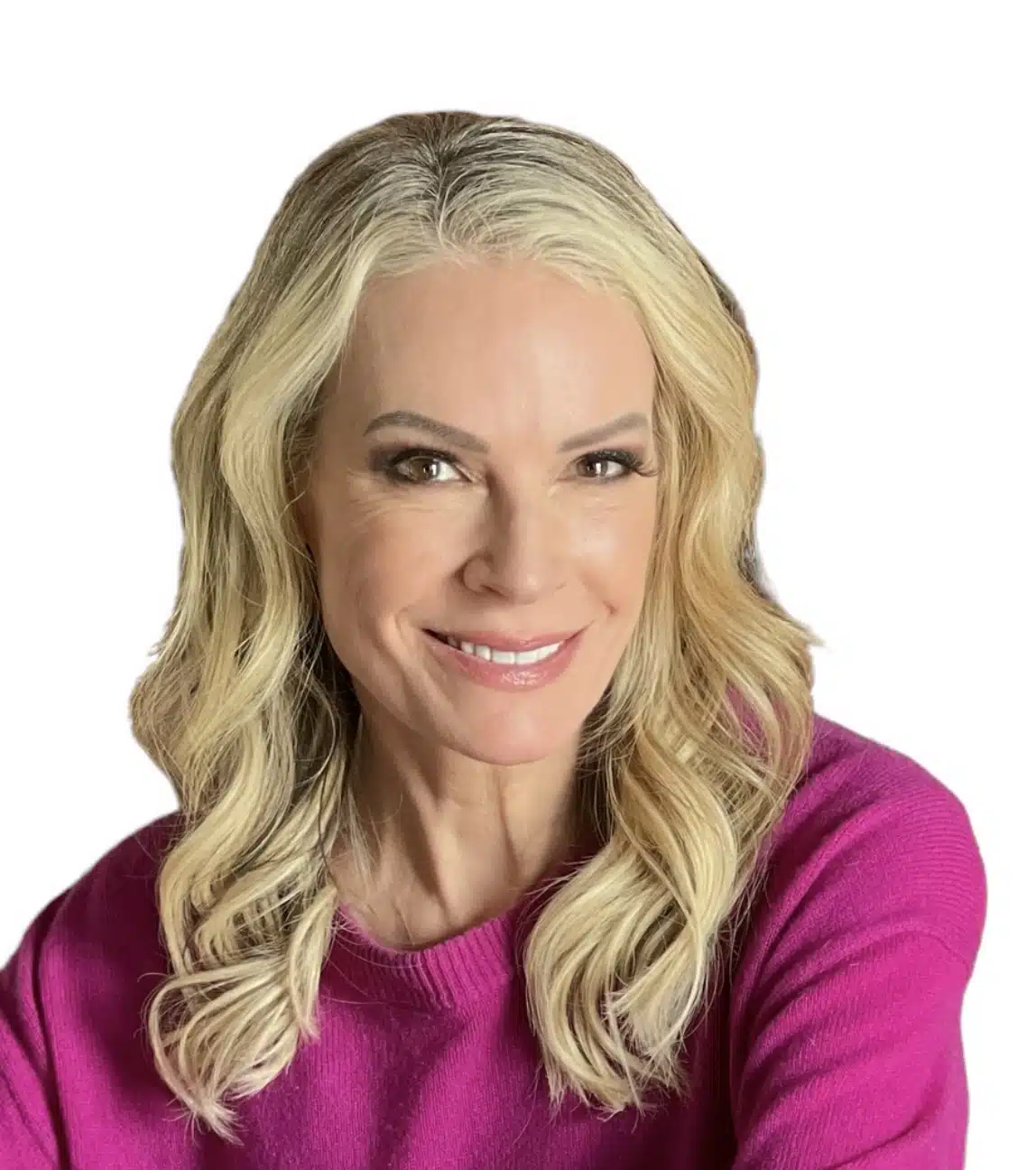
Dr. Nina Savelle-Rocklin is a psychoanalyst, author and radio host specializing in binge eating disorder. She is the author of The Binge Cure: 7 Steps to Outsmart Emotional Eating and Food for Thought: Perspectives on Eating Disorders, and co-editor of Beyond the Primal Addiction. She hosts The Dr. Nina Show radio program on LA Talk Radio.
More episodes
